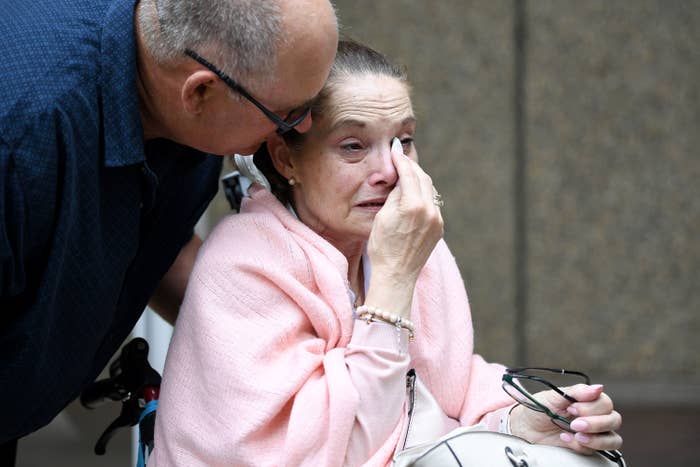
Hundreds of women living in pain after they were fitted with transvaginal mesh devices have won a landmark class action case against Ethicon, a subsidiary of Johnson & Johnson.
Seven years after a class action involving more than 1,350 women began, the Federal Court's Justice Anna Katzmann handed down a searing judgement in which she found Ethicon had acted negligently, and that patients should be compensated.
"We were treated like guinea pigs," one of the applicants, Julie Davis, told reporters outside court on Thursday. "They lied about it and did nothing to help."
Urogynaecological meshes, sometimes known as transvaginal meshes, are inserted into women as a treatment option for pelvic organ prolapse (when the connective tissue securing the vagina and uterus to the pelvis gives way after childbirth), or urinary incontinence.
"[Ethicon] were liable to compensate any applicant and/or group member who suffered an injury because of the defect for the amount of the loss and damage she sustained as a result of that injury," Katzmann said in an hour-long summary of her judgement on Thursday morning. "I also found that [Ethicon] engaged in misleading or deceptive conduct."
Katzmann said how much each woman would be entitled to in the compensation payout will be decided early next year.

She began the judgement by acknowledging the impact complications associated with the devices have had on the three lead complainants in the class action.
Katzmann detailed how Kathryn Gill had been fitted with "a large quantity of polypropylene mesh" known as "Prolift Total" to treat vaginal prolapse, which she sustained after the birth of her second child. Six months after she got the Ethicon device in 2007, Gill "could feel something sharp inside her vagina and a tearing sensation resulting in sharp pain", Katzmann said.
"The mesh had eroded and a piece of mesh was piercing the front wall of her vagina," Katzmann told the court, adding that Gill had undergone three surgeries to remove portions of the mesh. "The complications of the mesh surgery have taken a great physical and emotional toll on her. She now lives with constant pelvic pain... sometimes the pain is so bad she struggles to breathe."
Shine Lawyers, which ran the class action on behalf of the women, alleged that the warnings accompanying the implants were inadequate and that the implants caused an unacceptable rate of complications including erosion, incontinence and chronic pain.

South Australian woman and member of the class action Kim Blieschke travelled to Sydney for Katzmann's judgment.
"We are all debilitated, we all suffer in pain every day but it is just nice to have that acknowledgement," Blieschke told BuzzFeed News. "That it is not in our heads, it is something that we live every day."
Blieschke had Ethicon's ProLift technology, a polypropylene mesh implant, inserted into her vaginal wall to treat a pelvic organ prolapse. The procedure was described by her doctor as minor, temporary and uncomplicated, but from the moment she woke up from her transvaginal mesh implant surgery in 2006, her life has been defined by debilitating pain and repeated surgeries.
Blieschke said "no amount of compensation" would make up for the "pain and suffering" she, and other women, had suffered over the past decade.
"We suffer every day and those complications are lifelong," she said.
Katzmann reminded the court on Thursday of evidence given given in cross-examination by urogynaecologist Dr Piet Hinoul, Ethicon's former vice-president of medical affairs. He admitted from the time each of the Ethicon devices was supplied anywhere in the world, Ethicon knew it could cause a range of complications.
These complications included a foreign body reaction to surrounding tissue that would lead to pain and a risk of mesh exposure and extrusion into the vaginal canal or other organs.
"[Ethicon knew] all the devices could cause both acute and chronic pain, that chronic pain could be very damaging and debilitating, indeed life altering, and that multiple operations might be necessary to attempt to alleviate the pain," Katzmann said.

Shine Lawyers special counsel for class actions Rebecca Jancauskas said as many as 8,000 Australian women are thought to have been adversely impacted by pelvic mesh systems.
"Today's decision is a win for Australian women," Jancauskas told reporters outside the Federal Court on Thursday afternoon. "Today the court was scathing in its findings."
Jancauskas said it had been an "extremely hard-fought legal battle" which had taken a toll on the "brave women" involved.
"Given the years of suffering these women have endured, the fact that their lives have been turned upside down and they can no longer function as women, as mothers and as employees, we would expect [the compensation] to be significant," she said.
Ethicon has 21 days to lodge an appeal.
In January last year Johnson & Johnson withdrew from the market the controversial devices at the centre of the class action. The decision came less than a fortnight after some of the devices were banned by Australia's Therapeutic Goods Administration after a review found "the benefits do not outweigh the risks these products pose to patients".
In February last year, the barrister representing the women in the class action stressed to the judge that the pharmaceutical giant knew about adverse effects before marketing the products.
The case involved 48 witnesses, 37 of whom were experts including urologists, urogynaecologists, psychiatrists and biomedical engineers.
A Senate inquiry concluded early last year that the thousands of Australian women suffering "devastating complications" from transvaginal mesh implants had been "ignored" and "let down" by health professionals and regulatory bodies, and that the surgery should only be performed as a "last resort".
The inquiry estimated about 150,000 women in Australia have undergone transvaginal mesh procedures and recommended that doctors report all adverse effects of mesh implantation and a registry for all high-risk implantable devices be established.
There were more than 150 patient submissions made to the inquiry and almost all of them claimed there was no informed consent or awareness of the possible complications.
The inquiry heard that women who couldn't have vaginal sex due to ongoing sexual dysfunction from urogynaecological mesh "repeatedly" reported their doctors suggested having anal sex instead, and that half of the women who experienced adverse physical and psychological side effects after receiving an implant also suffered from a relationship breakdown after the procedure.
In October last year Australia's health minister Greg Hunt issued a national apology to the thousands of women whose lives have been damaged by the debilitating effects of pelvic mesh implants.
